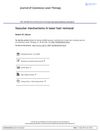Search
forLearn
5 / 8 resultslearn Osteopontin
signaling protein that, when suppressed, may grow hair by reducing inflammation and stem cell loss
learn Vascular Endothelial Growth Factor
learn Mesotherapy
technique to inject very small amounts of beneficial chemicals into the scalp
learn Minoxidil
An essential vasodilator with some anti-androgenic effects, has excellent safety record
Research
5 / 1000+ results
research Optimal Hair Transplant Recipient Site Slit Design: Minimizing Vascular Damage
Semiconical blades and coronal slits minimize vascular damage in hair transplants.
research HtrA1L364P Leads to Cognitive Dysfunction and Vascular Destruction Through TGF-β/Smad Signaling Pathway in CARASIL Model Mice
The HtrA1L364P mutation causes brain dysfunction and blood vessel damage.

research Vascular Mechanisms in Laser Hair Removal
Laser hair removal might also work by damaging blood vessels around hair follicles.

research Resident CD34-Positive Cells Contribute to Peri-Endothelial Cells and Vascular Morphogenesis in Salivary Gland After Irradiation
CD34-positive cells help repair and form new blood vessels in salivary glands after radiation.

research Innovative Reports on the Effects of Anabolic Androgenic Steroid Abuse - How to Lose Your Mind for the Love of Sport
Abusing steroids can damage your heart, muscles, reproductive system, liver, skin, and brain, and may increase the risk of Alzheimer's disease.
Community Join
5 / 107 resultscommunity Proposed new pathogenesis model for androgenetic alopecia (AGA)
The conversation discusses a new model for understanding androgenetic alopecia (AGA), linking it to dietary and lifestyle factors similar to PCOS, and highlighting the role of DHT, vascular damage, and inflammation. Treatments mentioned include Minoxidil, finasteride, and RU58841.
community Study: There is 70x Higher Unconjugated DHT in Feces Compared To Blood Levels in Young Adults - Gut Microbiota Manages DHT Recycling and Metabolism
Gut microbiota significantly influences androgen metabolism, impacting hair loss treatments like finasteride. Probiotics, dietary changes, and fecal microbiota transplants may help manage DHT levels and improve hair health.
community Atherosclerosis as cause of balding and treatment
Hair loss may be caused by calcification of capillaries in the scalp, restricting blood flow to hair follicles. A daily treatment regimen including high doses of Vitamins D and K, Magnesium, and Nattokinase could potentially decalcify these capillaries, improving blood flow and hair growth. However, some users warn against excessive Vitamin D intake and emphasize the need for medical consultation.
community microneedle, any long term users damage?
Microneedling is effective for hair growth, especially when combined with finasteride and minoxidil, but concerns exist about potential long-term skin damage. Users report increased collagen and elastin deposition, but the long-term effects on the scalp remain uncertain.
community Scientific evidence for Peppermint & Rosemary oils + My Experience
Natural treatments for hair loss, specifically peppermint oil and rosemary oil; how they can be used as a supplementary or alternative treatment to pharmaceuticals such as finasteride and minoxidil; and the personal experience of the user Divallo, who has seen an increase in density and thickness after using these oils for around 2.5 years. The post also touches on the potential antifungal properties of the oils and their effects on cutaneous blood flow.